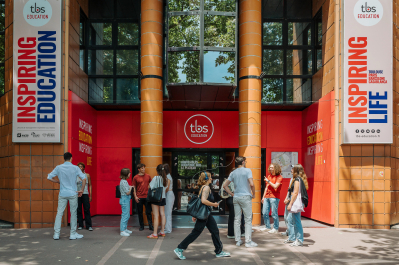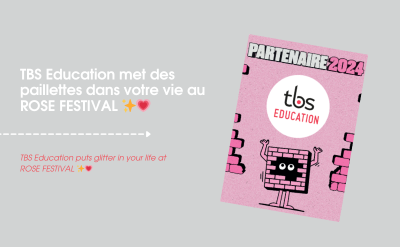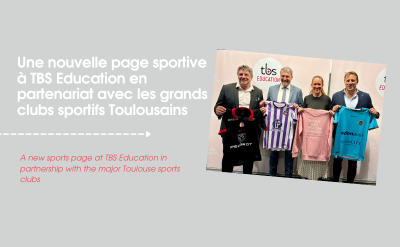News

Interview with Dr Mohamed Derrabi, General Manager of TBS Casablanca Campus
«International experience is essential to develop open-mindedness, autonomy, and adaptation...»
Le Matin: What are the new features of TBS in terms of schooling pathways?
Dr. Mohamed Derrabi: In September 2018 TBS Casablanca will offer 2 new pathways with cooperative training course: "Relations & Human Resources" and "Legal Management of Companies". Concerning our MBA Executive training, 2 new specialization courses are set up to better meet the needs of companies and help students to realize their professional project:
• the digital transformation.
• The development and creation of business. Those 2 new 120 hours modules will also be available to all those who wish to obtain precise and cutting-edge skills in these topics without having to be part of the Executive MBA promotion. This year, the efforts of TBS Casablanca will also be on the internationalization with our Bachelor in Management training (3 years post High School Diploma): at the start of the school year we will welcome our second promotion and the 2nd year students will begin our semesters of international exchange.
• Reception of students from other TBS campuses from Toulouse and Barcelona.
• The departure of our students for the other campuses of Toulouse or Barcelona or in one of our 98 universities in partnership dispatched on the 5 continents.
Le Matin: To what extent does TBS Casablanca support the development of students' soft skills?
Dr. Mohamed Derrabi: Toulouse Business School Casablanca aims to train daring, ethical, open and enthusiastic managers. We put everything in place to develop the "soft skills" of its students. The personalization of profiles is done at the selection of candidates, but also during the scholarship journey, because they come out of it different and employable. In our selection of candidates, we are looking for sharp profiles that are distinguished by a talent (personality, involvement in cultural fields, associative ...), open to the world (who have traveled), eager for knowledge ... we are also interested in profiles eager for business creation. Also, the international experience in our courses is unavoidable in order to work openness, autonomy, and adaptation, very important skills in the world of work today. The internationalization of the training of our students is a primary objective. Today more than ever, the world of management is interconnected. We need to train International Managers who integrate the related dimensions of multiculturalism, international openness, ability to work in the environment of multinational companies, the ability to manage transnational projects, etc. This is only possible if the training itself offers international exposure with the opportunity to mix with students from other parts of the world, to live, study and do internships abroad. During the training of our learners, we set up a personalized support through our Career Starter, a professional insertion support specific to TBS for research internships and jobs for our students. It includes: training sessions, personalized work, individual interviews, and speed coaching sessions. This program includes training to develop "soft skills" for the acquisition of manager manners and interpersonal skills.
Le Matin: In concrete terms, what are the actions of TBS to support the professional integration of the laureates?
Dr. Mohamed Derrabi: For easier access to employment and a promising career path, we put in place a well-balanced balance between:
• The courses are given by the university lecturers and researchers aiming at the preparation of the conceptual and analytical mind of the students as well as the process of structuring and solving problems.
• The practical courses given by professionals aims at the preparation of the students for the practical and technical nature of their jobs.
• Internships and corporate missions to prepare students for the business world.
• International trips to promote open-mindedness and autonomy in the other campuses of Toulouse, Barcelona, and Paris, or in one of our partner universities.
As mentioned above, for many years now TBS has been developing a professional insertion system of its own: the "Career Starter". It helps the student in his search for internship and employment. It includes: support for the writing of a CV and cover letter, personal coaching by experts, business workshops between young graduates in activity and students, etc. Every year, we also organize a recruitment forum, the "Talents & Future" Forum which takes place around March-April in our premises in Sidi Maârouf with the participation of many Moroccan and international companies. Finally, each student of the group, all campuses combined, also has access to the intranet of the school which lists, each year, more than 8,000 job offers and 20,000 internship offers. The professional integration rate of the TBS Casablanca laureates is 98% within 6 months after graduation. TBS Casablanca has joined the network Africa Sup.
Le Matin: What can you tell us about this affiliation and especially about the school's intention to open up to sub-Saharan Africa?
Dr Mohamed Derrabi: TBS is looking forward to joining elite schools such as École Centrale Casablanca, School of Industrial Management (EMINES), Emlyon Business School Africa Campus Casablanca, School of Business and Economics (ESSEC) ) Campus Africa, the National Institute of Applied Sciences (INSA) and the School of Engineering in Industrial Systems Engineering (EIGSI). The Africa Sup network aims to position these schools as leaders on the African continent and to train tomorrow's managers for Africa through training at the highest level. TBS shares the same vision than the institutions of Africa Sup in terms of academic and pedagogical levels, common values and inclusive training. Working with other quality schools to group our communication, recruitment, and cooperation in Sub-Saharan Africa seemed relevant to us. Today Toulouse Business School welcomes more than 300 students on the Casablanca campus, 12% of whom come from sub-Saharan countries. A proportion that it intends to increase up to 30% over time.















No comment
Log in to post comment. Log in.